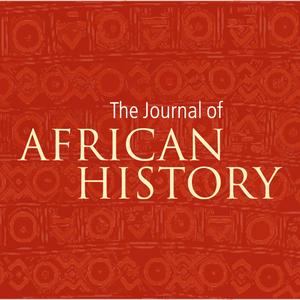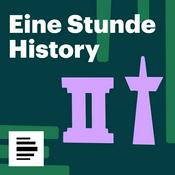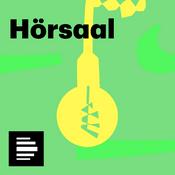The Journal of African History Podcast
The Journal of African History

Neueste Episode
16 Episoden
- Journal of African History Podcast: Volume 66 Retrospective
What does a year of cutting-edge African history scholarship reveal about where the field is heading? In this special episode marking the close of Volume 66, The Journal of African History managing editor Samuel Severson sits down with the journal’s regional editors—Abou Bamba (reviews and History Matters), Michelle Moyd (East Africa), Moses Ochonu (West and North Africa), and Thula Simpson (Southern Africa)—for a wide-ranging conversation about the state of African history research in 2025.
Rather than simply rehashing articles, our editors dig into the deeper currents shaping the field: Which archives are scholars turning to? What new methodological approaches are emerging in response to Africa's rapidly changing present? How are questions of positionality, ethics, and the real risks scholars face when researching politically contentious subjects reshaping what it means to write African history today?
Whether you're a contributor to JAH, a reader tracking the field’s evolution, or simply curious about the behind-the-scenes work of shaping a major academic journal, this episode offers a rare glimpse into how scholarly conversations actually happen—and where African history is headed next.
Articles Referenced in this Episode:
HISTORY MATTERS
Colonialism, Governance, and Fisheries: Perspectives from Lake Malawi
Milo Gough, University of Oxford; Bryson Nkhoma, Mzuzu University; Elias Chirwa, Mzuzu University; David Wilson, University of Strathclyde; Charles Knapp, University of Strathclyde; Tracy Morse, University of Strathclyde; Wapulumuka Mulwafu, Mzuzu University
Traditional Institutions and Cultural Heritage Law: The Case of Benin Bronzes
L. Amede Obiora, University of Arizona
The New Instrumental Turn in Nigerian Historical Scholarship
Moses Ochonu, Vanderbilt University
Echoes of History: Legacies of the Benin Bronzes and Restitution within the Black Atlantic
Cresa Pugh, The New School
RESEARCH ARTICLES
Africans Championed Free Trade: Violence, Sovereignty, and Competition in the Era of Atlantic Slave Trade
Ana Lucia Araujo, Howard University
Diplomacy of Intimacy: Cameroonian Women’s Anticolonial Diplomacy with China in the Era of Decolonization
Caitlin Barker, Boston College
Women's Livelihood and Status Struggles in Tabora after the End of Slavery, 1920s–60
Felicitas Becker, Ghent University; Salvatory Nyanto, University of Dar es Salaam
Decolonizing Archival Narratives: Exploring Digital Bias in the Catalogs of Portuguese-Colonized African Territories
Agata Błoch, Tadeusz Manteuffel Institute of History; Guillem Martos Oms, University of Barcelona and National Archives of Catalonia; Clodomir Santana, Tadeusz Manteuffel Institute of History
Resurrecting the African Independent Pentecostal Church: Land, Education, and the Politics of Reconciliation during Kenya’s Decolonisation, 1952–69
Niels Boender, University of Edinburgh
Capitalist Flows and Working-Class Conditions: Colonial Labor Management and Racial Formations in Southeastern Africa, 1851–1900
Abikal Borah, San Diego State University
Manly Machines and Homely Objects: Gender, Development and Divergent Radio Technologies in Late-Colonial Ghana and Zambia
Peter Brooke, University of Oxford
The Voracious Frontier: Policing, War, and Mercantilism in Dutch South Africa, 1652–1830
Paul Clarke, Independent Scholar
African Correspondents in the Second World War in Burma: Reporting on Soldiers’ Experiences of Conflict, June–August 1945
Oliver Coates, University of Cambridge
Of “Akankyemaa” and Beyond: Gender and Mining Income Disruptions in Late Colonial Asante
David Damtar, University of Oxford
Neo-Colonialism, Underdevelopment, and the Making of a Radical Pan-African and Leftist Economic Institute, 1970–80
Bright Gyamfi, Rutgers University
Of Cattle and Community: Women’s History-telling in Western Uganda's Nanga Performances, 1900–Present
Caitlin Cooke Monroe, University of Northern Colorado
Making Violators: Employers and African Workers in Colonial Dakar, 1918–43
Rachel M. Petrocelli, Santiago Canyon College
The Emergence of Social and Political Complexity in West Central Africa
John Thornton, Boston University
Building Legacy: Sports, Kasarani Stadium, and Moi’s Transnational Populist Politics, 1978–87
Chepchirchir Tirop, Boston University
“Sodabi Calamity Number One”: The Production of Palm Alcohol in Dahomey and its Repression, 1840–1975
Giovanni Tonolo, University of Florence
Harambee Co-operative Savings and Credit Society: Wealth, Inequality, and Accumulation in 1970s Kenya
Justin Willis, Durham University; Radha Upadhyaya, University of Nairobi; Eric Njuguna Kamau, British Institute in Eastern Africa
FEATURED REVIEWS
Ambiguous Echoes of the Colonial Partition: Alternative Futures from the Casamançais Past in Senegal
Mark Deets, The American University in Cairo
Review of Séverine Awenengo Dalberto's L'idée de la Casamance autonome: Possibles et dettes morales de la situation coloniale au Sénégal
Intimate Archives and Anterooms
Khwezi Mkhize, Duke University
Review of Joel Cabrita's Written Out: The Silencing of Regina Gelana Twala - In this episode Mark Deets (AUC) joins editor Abou Bamba (Gettysburg) to discuss “Ambiguous Echoes of the Colonial Partition: Alternative Futures from the Casamançais Past in Senegal.” This featured review explores Séverine Awenengo Dalberto’s L’idée de la Casamance autonome (Karthala Edition, 2024) as well as the political controversy surrounding its publication. In the podcast, Deets further discusses his own work on the Casamance—notably his book A Country of Defiance (2023, Ohio University Press)—and offers insights on Senegalese politics, historical contingency, and the importance of academic freedom and solidarity as scholars delve into important but sensitive historical questions.
- In this episode, David Wilson (University of Strathclyde) joins guest host Ayodeji Adegbite (Brown University) to discuss the Open Access article, "Colonialism, Governance, and Fisheries: Perspectives from Lake Malawi," co-authored with Milo Gough, Bryson Nkhoma, Elias Chirwa, Charles Knapp, Tracy Morse, and Wapulumuka Mulwafu.
Wilson details how this article—situated at the intersection of environmental science and historical research—sheds light on both the history and contemporary dynamics of natural resource governance in Africa and beyond. He explains the development of two parallel fisheries regimes in late colonial Malawi: a colonial system marked by exclusionary, centralized decision-making, and an indigenous regime grounded in place-based knowledge, local customs, beliefs, and practices. The latter regime, led by Senior Chief Makanjira, yielded sustainable outcomes, in contrast to the colonial regime, which failed to achieve similar results.
The conversation further explores the methodological challenges faced by the authors, highlighting how knowledge hierarchies continue to shape natural resource management, and gives practical recommendations for collaborative models in natural resource governance across Africa. - Muoki Mbunga (Tufts University) joins East Africa editor Michelle Moyd to discuss his newly published open access article, “Who Deserves to Die? The Moral Logic of Mau Mau Killings in Colonial Kenya, 1952–56.” In their conversation, Mbunga details how his novel use of the captured documents of Mau Mau guerrillas enabled him to explore the ways that Kikuyu ritual and traditions were deployed and shaped by the realities of the asymmetrical conflict. By examining the perspectives of fighters themselves on why, who, and how to kill, Mbunga makes an important contribution to the rich historiography on the conflict in 1950s Kenya.
The open access article is available online and in print issue 65/3 of the JAH. - In this episode, John Aerni-Flessner (MSU) joins editor Moses Ochonu (Vanderbilt) to discuss the article, "Lesotho and the QwaQwa Ski Resort, 1975–82: Border Disputes and South Africa's Increasingly Deadly Responses," co-authored with Chitja Twala (Limpopo).
John details how a proposed ski resort in QwaQwa served as a site for adjoining Lesotho — despite its economic dependence and comparative military weakness — to hone a foreign-policy opposed to South African apartheid. He further details how this approach engendered brazen raids from the South African military, a harbinger of the escalating violence which would wash over the border states and within homelands and townships over the 1980s.
The conversation further explores the coming of age of postcolonial African diplomacy, novel strategies for securing documentary evidence in South Africa, and the value of collaborative work in historical research and writing.
The Open Access article is available here.
Weitere Bildung Podcasts
Trending Bildung Podcasts
Über The Journal of African History Podcast
The Journal of African History Podcast highlights interviews with historians whose work has appeared in The Journal of African History, a leading source of peer-reviewed scholarship on Africa’s past since its creation in 1960. Hosted by journal editors and occasional guest hosts, episodes include discussions on how scholars find and interpret sources for African history, how authors’ research contributes to debates among historians, and how Africanist scholarship can add much-needed context to broader social and political debates.
Podcast-WebsiteHöre The Journal of African History Podcast, {ungeskriptet} - Gespräche, die dich weiter bringen und viele andere Podcasts aus aller Welt mit der radio.at-App

Hol dir die kostenlose radio.at App
- Sender und Podcasts favorisieren
- Streamen via Wifi oder Bluetooth
- Unterstützt Carplay & Android Auto
- viele weitere App Funktionen
Hol dir die kostenlose radio.at App
- Sender und Podcasts favorisieren
- Streamen via Wifi oder Bluetooth
- Unterstützt Carplay & Android Auto
- viele weitere App Funktionen


The Journal of African History Podcast
Code scannen,
App laden,
loshören.
App laden,
loshören.






































